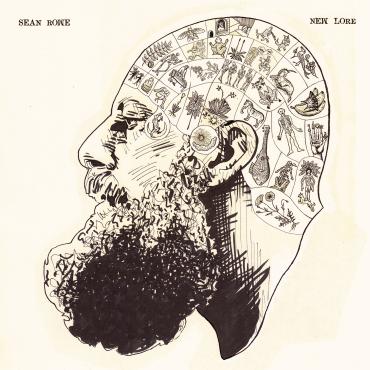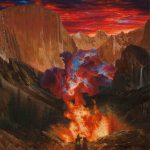
Sean Rowe has the kind of voice that gets attention. When you put him on, you’re bound to get at least one person asking, “Who’s this?” He sings in a baritone so deep, it feels otherworldly, like he’s some kind of mythical prophet, bellowing mind-blowing truths that we should savor and keep. And across all his records, Rowe has shown himself to be a real storyteller, writing intricate songs that explore the perils of being an artist, a father, a lover, and a human being. He mines these struggles more than ever on his latest release, New Lore.
On his last record, 2014’s Madman, Rowe moved away from his signature starker sound and gotten a bit more playful with soulful R&B tunes like the phenomenally groovy “Desiree” and the swampy rocker “Shine My Diamond Ring.” Rowe flexed more muscles on Madman, stepping out of the folk troubadour box we had put him into. And while New Lore is something of a return to form for Rowe, with its darker, pared down acoustic tunes, it is one of his most polished, sophisticated records yet. Filled with quiet, thoughtful lyrics about the hardships that come with being on the road as a father and partner, New Lore is as stunning as it is heartbreaking.
Rowe tries to remain grounded, both to his family and his home, and to the literal earth. Rowe is something of a wild man, a forager of the land, and he channels that in much of New Lore, from the cover art to his lyrics. “Gas Station Rose” finds him coming to terms with feeling disconnected through the metaphor of making a mountain out of a molehill. The passing of time manifests itself in Rowe’s fear of missing out and growing apart. He sings, “Another major jump back/Another sweet in between/At least we’re both confused together.” On “I’ll Follow Your Trail” Rowe watches as his son comes of age, channeling a pastoral Cat Stevens sound and adding soft horns. He muses on the quickness of growing up in this sweet ode to fatherhood. And on the album’s standout booty-shaker “Newton’s Cradle”, Rowe sets the scene for passionate fights and reunions between lovers amidst a frenzy of strings and soulful harmonies.
On “The Very First Snow” Rowe grapples with his grief after the passing of someone important in his life. “Though you won’t get that cold anymore/You will freeze in the back of my brain/And in my dreams I will open the door/If you will lean into the frame,” he sings, like it’s coming from a place deep in his gut, instinctual and unfiltered. “I Can’t Make a Living From Holding You” is Rowe’s meditation on what it means to be a man, from feeling inadequate to the burning need to be a provider while also being present. It’s a sad beauty about loneliness and the misconception of the road being a symbol of freedom for musicians, as he comes home with new battle scars and has to start again. Rowe continues to grow as an artist, even as he confronts the difficulties that come with it.



